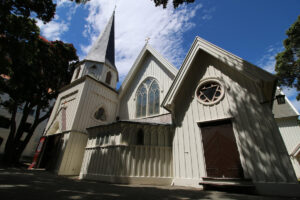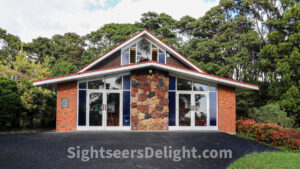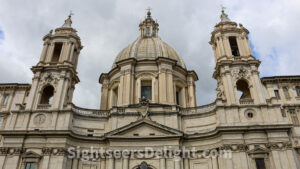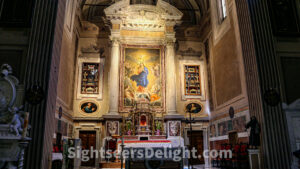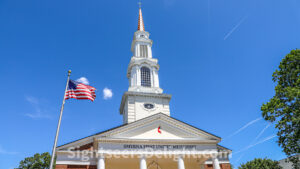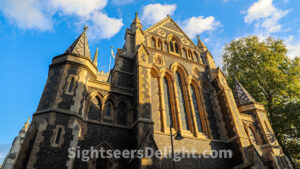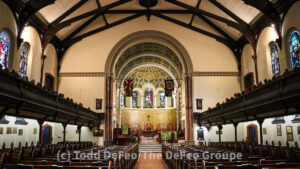Old North Church is famous as the location where the message of “one if by land, two if by sea” was sent. In April 1775, Paul Revere told a trio of Boston patriots to hang two lanterns in the steeple to indicate British troops were approaching by sea. The church, built in December 1723, was inspired by the works of Christopher Wren, a British architect responsible for rebuilding London after the Great Fire.
02113
Old St Paul’s was built in 1865-66 and constructed from New Zealand native timbers. Rev. Frederick Thatcher designed the Gothic Revival structure, which served as the Diocese of Wellington of the Anglican Church between 1866 and 1964. The building was nearly demolished in the 1960s. However, a civic organization formed to save the structure from demolition.
Oratia Combined Church dates to 1872 and opened initially on land Queen Victoria granted to Waikumete Parish settlers. The current church opened in 1968.
Salisbury Cathedral was consecrated in 1220 to replace the cathedral in Old Sarum. Today, Salisbury Cathedral, an extraordinary building that remains a leading example of Early English architecture, is the centerpiece of the city. Its central portion of the cathedral took 38 years to complete, from 1220 until 1258. While the structure itself is spectacular, the church is home to one of four surviving original copies of the Magna Carta. A master stonemason present at Runnymede and tasked with distributing copies of the document, Elias of Dereham, brought Salisbury’s version to the cathedral.
The 17th-century Baroque Sant’Agnese in Agone faces Piazza Navona, the location where the Saint Agnes, an early Christian saint, was martyred in the ancient Stadium of Domitian. Pope Innocent X instigated construction of the church, which began in 1652. Architects Girolamo Rainaldi and his son, Carlo Rainaldi, oversaw construction as did architect Francesco Borromini.
Capuchin Crypt
For a uniquely different perspective of the “Eternal City,” head over to the Capuchin Crypt. Located beneath Santa Maria della Concezione dei Cappuccini, the crypt is home to skeletal remains of thousands of bodies said to be Capuchin friars buried by their order, which adorn the crypt’s walls as a tribute to how swiftly time on Earth passes and humans’ mortality.
Santa Maria Novella dates to the mid 13th century. A pair of Dominican friars, Fra Sisto da Firenze and Fra Ristoro da Campi, designed the church. It is known as Novella, which means “new” because it was built on the site of the 9th-century oratory of Santa Maria delle Vigne. Leon Battista Alberti completed the church’s façade in 1470. Admittedly, it would be nearly impossible to list every church in Florence that is worth seeing, not to mention how dif-ficult it would be to actually visit each church. Certainly the four aforemen-tioned churches offer a nice overview and can easily be seen in a day or two, or spread out over a longer period of time, depending on how long one plans on spending in Florence.
Smyrna First United Methodist Church in downtown Smyrna, Georgia, is one of the oldest institutions in the Jonquil City, dating to about 1838. The current structure dates to June 1967, replacing a five-and-a-half-decade-old structure. In 1911, the church built its first brick structure, an edifice along Atlanta Road.
30080
Southwark Cathedral, formally The Cathedral and Collegiate Church of St Saviour and St Mary Overie, is an Anglican Cathedral located on the south bank of the River Thames. The cathedral is the mother church of the Anglican Diocese of Southwark, which was created in 1905. The current structure uses the form of a Gothic edifice built between 1220 and 1420. However, the cathedral reconstructed the nave in the late 19th-century.
The congregation of St. Andrew’s Church was founded in 1830 as the first Church of Scotland congregation. When it was founded, the congregation was loacted in what was then the Town of York. A portion of the congregation broke away following the 1843 split of the Presbyterian Church in Scotland. The current building, a fantastic Romanesque Revival design, opened in 1876.

